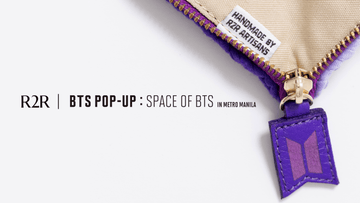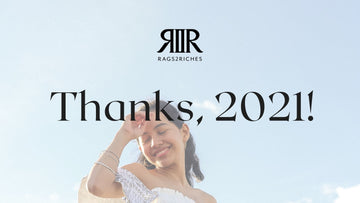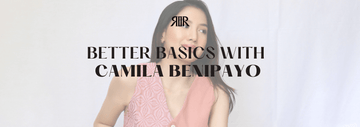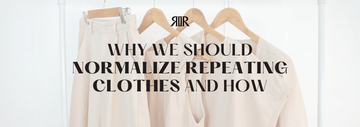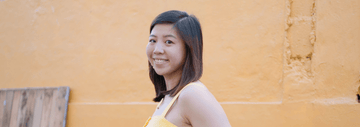
With the release of Rags2Riches (R2R)’s latest collection for Summer 2019, Hardin, we asked three inspiring women to be the advocate-ambassadors for the collection. These women advocate for inspiring causes, create a positive influence in their own communities, and live a life of bravery, compassion, and intention.
Jana Bunagan of The Good Trade is one of them and the first person to be featured in a three-part interview series of the Hardin advocate-ambassadors.
The collection was shot last March 20 and it was definitely a busy day for everyone, but in between outfit changes we were able to sit down with each one and get to know a little bit more about them and here’s what we learned:
1. Tell us a bit about yourself
My name is Jana. I’m 24, I work as a stock trader, and I do The Good Trade on the side. I have this other initiative called Create Good so it’s three things: We have Street Store which is like a pop-up shop for the homeless. It’s stocked by donations and they can shop for free so instead of packing things and just handing it to them they can actually choose which is something they don’t usually get. And then I have Re-Store which is like a fundraiser, we ask companies for their old items, so it’s totally brand new and then we sell them and with the funds, we raise we use for the Street Store. And then the last one is called Refresh, we collect wedding flowers after the reception and then we go to NGOs that help women who are victims of human trafficking or domestic abuse and then we host a workshop.
2. What for you is a meaningful life?
Being kind, treating people nicely, valuing resources, avoiding wastage. I feel like there’s a big misconception that when you go zero waste you need all these Instagrammable things––you buy your new this and that and then we forget that zero waste is about repurposing and utilizing things you already have so that you don’t produce any more waste.
"Zero waste is about repurposing and utilizing things you already have so that you don’t produce any more waste."
3. How did the Good Trade come about?
I was telling you about the initiatives I do for community development. The thing about that is I have to consciously do it. I have to set aside time for me to do it and while I’m doing all these things, [I thought] why do I have to set aside time to be kind? Why can’t I do it all the time? Why can’t it be a normal thing in my life?
The more I looked into it, it’s how I came about sustainability and zero waste. I learned that there are so many issues and you know one of them is about fair trade and good working conditions. I read about the factory that collapsed in Bangladesh five years ago and then there’s the issue of animal testing in labs and then we’re not able to continue cultures because no one wants to continue it. So yeah, it was a lot of things but it all boiled down to sustainability; it was the main factor in all of it.
"I [had] to set aside time for me to do [the community development initiatives] and while I’m doing all these things, [I thought] why do I have to set aside time to be kind? Why can’t I do it all the time? Why can’t it be a normal thing in my life?"
4. What was your intention behind creating The Good Trade?
Last year the zero waste movement started picking up and as a person who was trying to be more sustainable, it was also a struggle that I faced looking for brands and actually buying from them because they’re all over Metro Manila and with the traffic it’s just so impossible to do so I wanted to eliminate that step so that it’s more accessible to more people.
The Good Trade is not just a fair. We also make it easier for people to donate, to recycle, and really just close the loop. We have alteration stations, we have donations and recycling stations which can help you in that transition.
5. What have you learned throughout your endeavor?
I think it would be that everyone can do something good and it might look different from how you do good but that’s okay and it doesn’t mean that they’re doing better than you or you are doing better than them because at the end of the day, if you want to be sustainable, it really has to be a movement. The fact that more people are doing it is actually a really, really good thing so you have to respect other people’s journeys.
"Everyone can do something good and it might look different from how you do good but that’s okay and it doesn’t mean that they’re doing better than you or you are doing better than them because at the end of the day, if you want to be sustainable, it really has to be a movement."
6. What are some struggles that you deal with regarding the path you’ve chosen?
I love my job. I’ve been in finance for five years, including my internship, and I guess it sucks that it came to a point that I had to choose because I was really trying to balance it. But then I realized that in the process of choosing both my job and The Good Trade, I was sacrificing my well-being which was even tougher. There was a point that I was just super cranky. Every time somebody tells me something, I’m like “Can you not––can you just deal with it yourself?”
I think this year, I have to learn how to take care of myself because The Good Trade is at the vanguard of a movement that proves that sustainability isn’t just a buzzword in Manila and there are tons of opportunities for the initiative to grow. It’s a good thing when people want to start to do something good but I can't say yes to everything because then there will be nothing left for myself and you know I can’t share anything if my cup is empty. It has to overflow so I can share it with others. The biggest struggle is really taking care of myself while really maximizing The Good Trade's potential.
"Sustainability isn’t just a buzzword in Manila and there are tons of opportunities for the initiative to grow."
7. What is your advocacy?
At The Good Trade, we look at five things and before we get a merchant, we make sure that at least you fall under one of those five categories like ethical fashion, veganism––whether it’s skincare or food––“is it package free?”, “is it upcycled?”, “where does it come from?” Then it has to be something that can help you with zero waste. We really screen those things and hopefully, one day embracing one of those values becomes a norm rather than an add-on.
8. What kind of change do you wanna see through your advocacy?
Hopefully, everyone just embraces an eco ethos when it comes to doing business and I say that because capitalism is the system right now and it’s not really the ideal while we’re pushing for sustainability but then you can’t just change the system overnight.
9. What is the most joyful thing about what you do?
It’s nice when people leave a message on our group and say “I made this transition because of The Good Trade” and like “your posts inspire us” or “we bought this at the fair, it’s really helpful, keep doing what you do”.
I can't say yes to everything because then there will be nothing left for myself and you know I can’t share anything if my cup is empty. It has to overflow so I can share it with others. The biggest struggle is really taking care of myself.
10. What’s one sustainable practice you try to follow every day?
I don’t buy bottled water anymore; I always bring my own tumbler. When it comes to food though, sometimes I find myself in a dilemma, like I did a shoot the other week with this magazine and they offered food for everyone but it was take-out and I don’t wanna be rude and say “I’m not gonna eat that” because it’s still food and it’s gonna be a waste if I don’t eat it so that’s another thing.
11. What advice can you give to someone about pursuing their purpose and passion?
I think you have to start small. It doesn’t have to be like a one-time, big-time step. You don’t have to think about quitting your job right away. Just do something every day. Maybe this week, work on your brand, and the next week, work on your products. Then slowly build it. Then when it’s stable and it comes to a point where it is able to sustain itself, then maybe that’s the time you quit.
Words by Victoria Venzon / Photos by Jam Macaraeg / Accessories by Things That Matter (Cai Earrings by Piesa, Beaded Earrings by Tejo, and Tala Necklace by TAYO)
She Dares To is a blog series in which we sit down and talk to women who, in this time and climate, dare to live a life of bravery, compassion, and intention. These are women whom we think the world needs to meet and we’re so happy we got to have these meaningful conversations with them that we can share with you.










